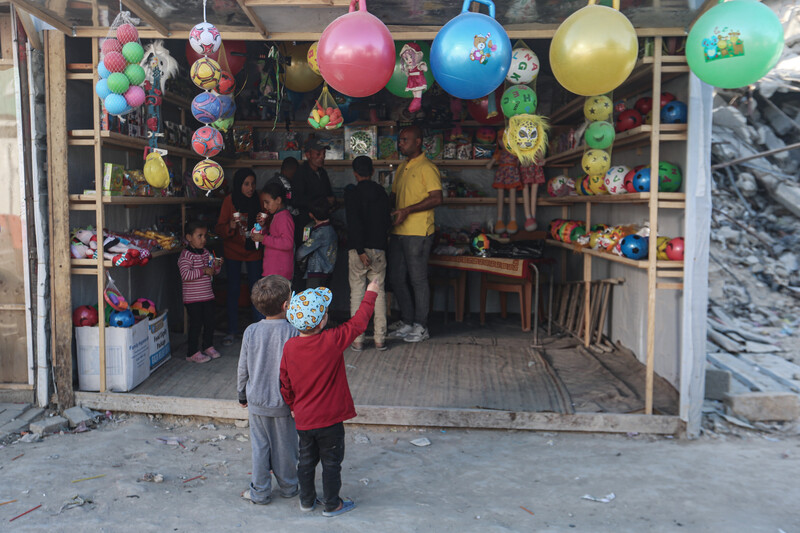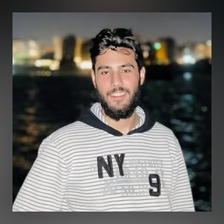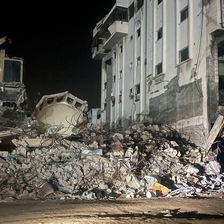2 April 2025

Children in Jabaliya look for presents for the Eid al-Fitr on 31 March, trying to preserve a sense of normalcy even as Israel’s aggression rages.
APA imagesDuring the Eid el-Fitr, the holiday at the end of Ramadan, Muin Abu Al-Mehza, 58, would usually celebrate together with his family and go visit relatives, as per tradition.
Muin has two sons and two daughters. One daughter moved to Kuwait with her husband. But his other children live close by, and his oldest son, Sami, 31, built an apartment for his family above Muin’s home.
The holidays were always a time for celebration for the family, as it generally is for everyone in Gaza.
But the past two festive seasons have been anything but joyous in the besieged and devastated coastal territory, home to 2.3 million people now facing starvation and Israel’s genocidal military violence again.
Last Ramadan, Muin’s family was struggling with an acute shortage of food. They had been displaced from their home and were struggling for shelter, warmth and water.
“If I could find a kilogram of flour, it would cost $35,” Muin recalled.
This Ramadan has not been very different. While food was more available at the beginning of March, it is now scarce again after Israel breached the ceasefire, closed all crossings to humanitarian aid and resumed bombing.
Water is yet again at a premium, and with no electricity, there are no festive lights of the kind traditionally decorating homes and streets.
“My son Muhammad used to clean the street and prepare it for Ramadan,” Muin said. “Whatever we wanted, we could find in the market.”
Muin’s family did take advantage of the brief ceasefire to go home to the Beach Camp, but their house was bombed and badly damaged. While two rooms remain usable, they’ve had to improvise to survive.
“My oldest brother built two small rooms from wood and plastic so they could have a place to stay,” Muhammad, 23, said.
Displaced again for Eid
Muin’s nearest mosque is completely destroyed, and residents have set up a makeshift prayer space, though it is hard for Muin to take advantage of it.
Getting around for him was never easy. Due to a medical error at birth, Muin has been unable to walk without the aid of crutches since childhood. But he used to have a car adapted to his needs.
Both the car and garage it was in were destroyed in an Israeli airstrike in July 2024, however, and he now struggles to get anywhere.
But at least Muin and his family were at home for the Eid, even if their home is in ruins.
Most people in Gaza are not.
Ehab Nafez Shallah, 45, and his family left their home in the first week of the Israeli attacks, on 13 October 2023. They ended up displaced in a school in Deir al-Balah. Their home is completely destroyed, and they have no shelter other than the tent they are staying in.
“We didn’t find even one room to settle in,” Ehab, a former customs officer, told The Electronic Intifada.
Like almost everyone else, he and his wife and their seven children struggled with the famine last Ramadan. And now, with crossings closed again, food prices have spiked and famine looms again.
Like last year, Ehab buys whatever food he can find. And things are quickly returning to how they were then.
“Cooking gas, which was available in the market during the ceasefire, is now nonexistent in the city,” Ehab said.
The fear of Israel’s indiscriminate violence is also back. People had the opportunity to pray in mosques during the ceasefire, but few try now for fear of being targeted.
At least, said Ehab, grasping for small mercies, his family is together.
“Gatherings are better because my family and I are in one place,” Ehab said.
Watching from afar
Islam Ahmad Shallah, 35, left Gaza in March 2017.
He struggled to find stable work, however, so when an opportunity arose to work with his brother in Qatar, he took it.
There, Islam built a new life. He got married, and he and wife now have a son and daughter.
But his parents and siblings remained in Gaza, and Islam fondly remembers the festive season at home.
“Ramadan in Gaza was the best,” Islam said about being surrounded by family and familiar faces. His days were spent working or studying, followed by a nap in the afternoon.
“I loved seeing my friends and shopping for my parents before sunset,” he recalled.
Now, while his life has improved in Qatar, where he is a site operations manager for a construction company, he watches with horror what is happening back home.
His family is divided. His parents and two brothers are in the north, and his sister and another brother are in the south.
Having lived through Israel’s aggressions in 2008, 2012 and 2014, Islam knew how hard it would be to stay in contact. Still, he tried, mainly communicating over the internet when his family had access.
That wasn’t always.
“The longest I went without hearing from them was about a week,” he said.
Last Ramadan was particularly difficult for Islam in Qatar.
“We didn’t celebrate at all – no decorations, nothing,” he said. “Gaza was being bombed 24/7. I was always afraid something would happen to my family.”
Both his family and he enjoyed the brief respite the ceasefire offered.
“My parents finally left the tent and moved into a small apartment with my sister,” Islam said.
Food was coming in and prices had dropped a little.
But now, it’s back to the prior desperate situation, and Islam is back to watching events from afar with growing apprehension.
“For me, life did not change as I am still afraid [for] my family. I won’t be at peace until the Rafah crossing opens and I can see them.”
Khaled Al-Qershali is a writer and translator.





